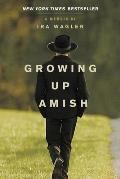
If you're a fan of Amish fiction, you probably don't want to read this book--but you should. The problem is that you might not want to read Amish fiction again.The picture of Amish life as a series of neighborhood barn raisings, quilting bees, cute little barefoot girls wearing bonnets and crisp aprons chasing kittens past the clothesline strung with with black pants with no zippers, home cookin' style meals with fried chicken, mashed potatoes, freshly baked bread spread with homemade jam, and green beans fresh from the garden is not what you will find in Ira Wagler's memoir of what life was like "growing up Amish." Instead, the author provides an honest, but definitely not bitter, account of what it was like to be Amish and why he could not remain a member of the Amish church and live in the community in which he had been raised.
Wagler was born in the Old Order Amish community of Aylmer, Ontario, the ninth in a family of eleven children. In the first part of the book Wagler writes about Amish life and culture, and it's fascinating to read from an "insider" what exactly that is like. He describes family life, church services, and school. Most poignant is his account of the bullying of Nicholas Herrfort, a child from "that unusual, or odd family" that exists in all of our communities. With great beauty and sadness, Wagler writes of the tragedy of Nicholas, and we all hang our heads in shame because even though we may not have grown up Amish, we've been human children who have at the least stood by silently while some other poor child was tortured.
After two of Wagler's brothers and one sister leave the Amish, his father moves the family to Bloomfield, Iowa, hoping that he would be able to keep his remaining sons Amish in a new place. It was here that Wagler spent his rebellious "Rumspringa" teen years, running around with a group of five other boys, hunting, staying out late, drinking beer and smoking, and telling off-color jokes. But typical teen rebellion turned to something much more serious when, at seventeen, Wagler left home for the first time:
"One fateful, starless, April night, I got up at 2:00 a.m. in the pitch black darkness, left a scribbled note under my pillow, and walked away--all my earthly belongings stuffed in a little black duffel bag."The rest of Wagler's memoir describes a cycle of returns and departures. He leaves his family, feels empty, attempts to fill the emptiness by returning to what is familiar (family and church), feels empty, and in an attempt to fill the emptiness, leaves again. Wagler's story continues to fascinate, as he recounts a family member's tragic accident, his own attempts to settle into the Amish community by getting married and joining the church, and his ultimate decision to leave the Amish church for good.
While many perceive the Amish to be a people whose withdrawal from modern life makes them closer to God, people who experience a rich spiritual life, Wagler's experience tells a different story. A faith that is based on law-keeping leaves its adherents feeling empty, distant from God and from each other. Ironically, Wagler first hears the gospel from an Amish man who did not grow up in the Amish faith, and he experiences true conversion:
"For the first time, I truly grasped that Christ had died for me--suffered, bled, and died--and that I could be his through faith. I was amazed at how simple it really was. Why had it always seemed so hard, so impossible before?... He who gives life to the lifeless gave life to me."The jacket copy of this book describes it as a charming, poignant, coming-of-age story, and yet it is so much deeper than that. You will laugh, cry, and be moved--Wagler is a gifted writer. But his story points out the futility of a faith that attempts to win God's favor by obedience to men's laws, and the joy of the salvation that comes from faith in Christ alone.
No comments:
Post a Comment